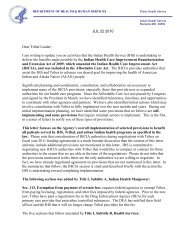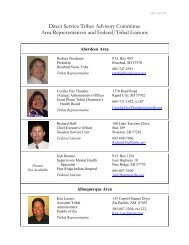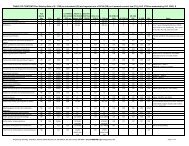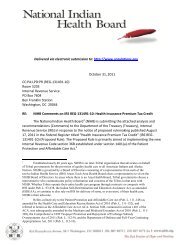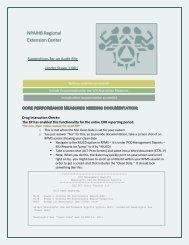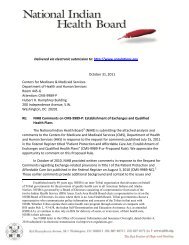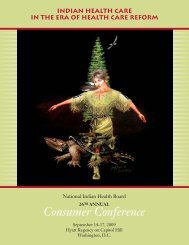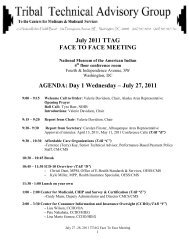mmpc - National Indian Health Board
mmpc - National Indian Health Board
mmpc - National Indian Health Board
You also want an ePaper? Increase the reach of your titles
YUMPU automatically turns print PDFs into web optimized ePapers that Google loves.
Draft Report: Currently being circulated for Tribal leader and health director review and<br />
comment. Please provide comments by October 30, 2012 to Liz Heintzman at the<br />
<strong>National</strong> <strong>Indian</strong> <strong>Health</strong> <strong>Board</strong> at EHeintzman@nihb.org.<br />
HHS and CMS both recognize this authority in their tribal consultation policy:<br />
Since the formation of the Union, the United States (U.S.) has recognized<br />
<strong>Indian</strong> Tribes as sovereign nations. A unique government-to-government<br />
relationship exists between <strong>Indian</strong> Tribes and the Federal Government<br />
and this relationship is grounded in the U.S. Constitution, numerous<br />
treaties, statutes, Federal case law, regulations, and executive orders that<br />
establish and define a trust relationship with <strong>Indian</strong> Tribes. This<br />
relationship is derived from the political and legal relationship that <strong>Indian</strong><br />
Tribes have with the Federal Government and is not based upon race.<br />
This special relationship is affirmed in statutes and various Presidential<br />
Executive Orders … 7<br />
While CMS often looks to the Social Security Act for authority, the historic and complex body of federal<br />
<strong>Indian</strong> law and case law applies throughout the federal government to all agencies, including CMS. The<br />
intent of this paper is to provide a brief summary of federal <strong>Indian</strong> law that is most relevant to current<br />
and future regulations and guidance regarding participation of <strong>Indian</strong>s and the <strong>Indian</strong> health system in<br />
Medicare, Medicaid, Child <strong>Health</strong> Insurance Programs, and health insurance exchanges.<br />
II. The United States has a Trust Responsibility to <strong>Indian</strong>s<br />
A. Origins of the trust responsibility to <strong>Indian</strong>s<br />
The federal trust responsibility to <strong>Indian</strong>s, and the related power to exercise control over <strong>Indian</strong> affairs<br />
in aid of that responsibility, is rooted in the United States Constitution – most significantly the <strong>Indian</strong><br />
Commerce Clause, the Treaty Clause, and the exercise of the Supremacy Clause. 8 The Constitution<br />
contains no explicit language that defines the trust relationship. Rather, the parameters of the trust<br />
responsibility have evolved over time through judicial pronouncements, treaties, Acts of Congress,<br />
Executive Orders, regulations, and the ongoing course of dealings between the federal government<br />
and <strong>Indian</strong> tribal governments.<br />
7 Dep't of <strong>Health</strong> and Human Services Tribal Consultation Policy (Dec. 14, 2010), at 1; Centers for Medicare and Medicaid<br />
Services Tribal Consultation Policy (Nov. 17, 2011), at 1.<br />
8 Morton v. Mancari, 417 U.S. 535, 551-552 (1974) ("The plenary power of Congress to deal with the special problems of<br />
<strong>Indian</strong>s is drawn both explicitly and implicitly from the Constitution itself."); McClanahan v. Arizona State Tax Comm’n, 411<br />
U.S. 164, 172, n.7 (1973); see also TASK FORCE No. 9, VOL. 1, AMERICAN INDIAN POLICY REVIEW COMM’N 31 (1976)<br />
(explaining the origins of Constitutional power to regulate <strong>Indian</strong> affairs as flowing from Congress’s treaty making powers,<br />
powers to regulate commerce with <strong>Indian</strong> tribes, and its authority to withhold appropriations); FELIX S. COHEN, HANDBOOK<br />
OF FEDERAL INDIAN LAW 418-423 (2005); Reid Payton Chambers, Judicial Enforcement of the Federal Trust Responsibility to<br />
<strong>Indian</strong>s, 27 STAN. L. REV. 1213, 1215-1220 (1975).<br />
41



